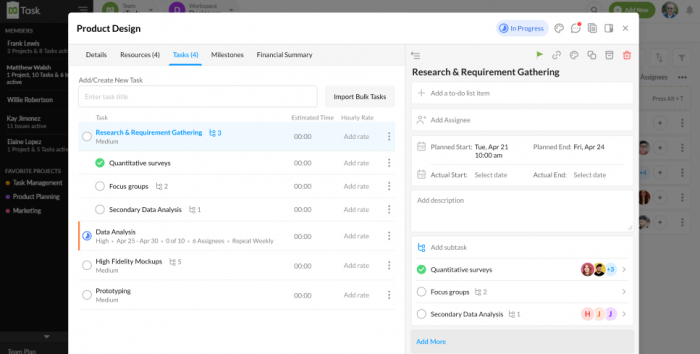To this day, we have heard about project management in a vast variety of areas, from sales and marketing to inventory management and much more. Project management now encompasses almost every division of our work and legal matters are no exception.
Be it the whole legal industry or the legal department of your organization, legal project management is how lawyers handle legal matters now.
Legal project management is how lawyers deal with their tasks. Proper systemization and organization make it easy to handle complex projects and extract good results.
In the following paragraphs, we will give you an overview of legal project management, its benefits, the skills required to become a good legal project manager, and the tools you can use for the management of your legal projects.
What Is Legal Project Management?

Legal project management entails the utilization of project management tools, skills, and other essentials to manage successfully plan, manage, and execute legal projects.
Susan Raridon Lambreth, the founder of the LPM (Legal Project Management) Institute, defines it as,
“a process of defining the parameters of a matter upfront, planning the course of the matter at the outset with the facts you have at the time, managing the matter, and, in the end, evaluating how the matter was handled (from both the firm or law department perspective and the client perspective).”
Project management in the legal industry is not much different from traditional project management, the only difference lies in the application of the process. While PMs utilize project management tools and techniques for the management of different processes in the company, legal representatives use the same method for the management of legal projects.
Using project management essentials for legal matters proves fruitful for lawyers and law firms as well as their clients. On the one hand, lawyers and law firms benefit from the systemic organization and execution of tasks, clients enjoy fruitful outcomes at the end.
Not only that, but it is also a very effective way of keeping all the parties engaged with the whole process. Stakeholders get to keep an eye on how and when tasks are accomplished, clients get to see the results each action produces or how it contributes to the end result, and lawyers get to streamline their work for better efficiency and productivity.
It’s a win-win through and through!
How Does Project Management for Legal Projects Work?
The project management process for lawyers is as simple as the traditional project management processes. There are four simple and easy steps one has to follow to create an efficient project management process. Here they are:
1. Define The Scope of Your Project
The first step in any project is identifying and defining the goals and objectives of the project. Defining the scope of the project is not a spontaneous decision, it needs proper thinking, planning, and discussion.
Before you start working on how you will go about a project, you have to make sure that everyone on the team as well as the stakeholders understand what you wish to achieve with this project. Only after understanding the end goals will everyone be able to focus their efforts in the right direction.
To make sure you take the right steps from the get-go, start with gathering as much information as you can. Build upon the experiences of your seniors, ask for opinions from your juniors, engage your clients and utilize your skills as well.
Once you have everything you might need, clearly define the goals of the project. Having clearly defined aims and objectives gives you a specific direction and streamlines the process to a great extent. That is why starting with defining the scope of the project is a given for all kinds of project management processes.
2. Create The Project Plan
Now that you have all the information you need for the smooth functioning of the process, you can start creating the project plan. This plan will be followed by all the individuals to accomplish the goals of the project.
To create the project plan, start by breaking down your project into smaller chunks of tasks and subtasks. Define the duration of completion for each task, set aside a budget for the whole project, organize tasks in the order of priority, assign resources to tasks and be ready to tackle any risks or issues that may arise during the course of the project.
Since you won’t be working on the plan alone, make sure everyone on your team understands their roles and responsibilities and has a firm understanding of what the task demands of them.
3. Execute The Plan
Finally, it’s time for action!
The plan you laid out so meticulously in the previous stage is now ready to be pushed into execution. Assign the resources to relevant tasks and track their performance to make sure there are no gaps in the implementation process.
Answer any questions your teammates might have, make sure everyone is clear on how the project will progress. This step demands your attention so that you can make sure everything progresses smoothly.
Also, make sure you and your team members are communicating and collaborating without any hindrance in the process. Smooth communication is akin to more efficient working and hence, better results.
During this phase, you also have to keep an eye on any obstacles that may threaten the smooth functioning of the project. Identify and remove bottlenecks, risks, issues that might arise during the process. Also, make sure that the process is on track with no delays.
Tracking and monitoring are essential since you want to be sure that your project is on the right track at all times.
4. Review And Revise the Project
Execution of the plan is not the last step of the project management process, in fact, the project is far from complete unless you and your team haven’t evaluated the results and identified the loopholes if any.
While reviewing and revising the project, you have to identify the gaps in the project and any issues that could have been avoided for better results. Once you have identified these issues, you can devise better strategies to avoid making the same mistakes in the future.
Also, do not shy away from constructive criticism. Ask for feedback from your employees as well as your clients so that you can make better decisions in the future.
Benefits Of Project Management in the Legal Industry

Project management has always produced favorable results for its users, no matter the industry they work in or the project they utilize it for. The same is the case when it comes to project management in the legal industry, here are some notable benefits of using the project management process for managing legal matters:
1. Increased Efficiency
When we say increased efficiency, we mean efficiency in every aspect of the project. From cost-effectiveness to efficient time management, project management tidies every step for you resulting in improved productivity and efficiency in all aspects of the project.
With a systemic timeline to guide you, you can focus your efforts to extract fruitful results. Project management entails that everything is planned out ahead of you, all you have to do is to follow that plan and enjoy the fruits of your hard work.
2. Attract More Business
Once you have good results backing your standing, you can certainly attract more business. New clients will definitely get impressed with your meticulousness and the results it bores.
Not only will you gain more clients from that, but your previous clients will also vouch for you. More clients mean more business and hence more profits. So, it will be a win for the lawyers and the firm.
3. Better communication
Probably one of the best things about project management is how it smoothens communication across channels. Stakeholders, clients, and members are on the same page which streamlines the process to a great extent.
It also creates a more harmonious work environment, making it easy for individuals to communicate freely and work more efficiently.
4. Forecasting
Once a law firm has gotten into the grind, it gains a lot of experience and can then use this experience to avoid any loopholes in the future. Also, once the lawyers and all the other staff have gotten acquainted with the process, working can become a lot easier.
Furthermore, you can also forecast how long a project will take or how successful it will be. Having a project management process also helps identify potential risks before they harm the progress of your project.
So, there is not one but multiple advantages of using project management for your legal business.
Who is a Legal Project Manager?
A legal project manager is a person responsible for planning, managing, and executing a legal project. Most firms do not have a specific person managing their project, it’s just lawyers handling everything on their own. Others, however, have legal project managers who handle every aspect of the legal process. And it is no secret that having an official legal project manager produces better results for the law firm than not having one.
These managers are responsible for a number of things, from the initiation phase till the end they manage every aspect of the project, making sure everything is perfect.
They define the scope of the project in collaboration with other members, discuss the details with all individuals involved, create the project plan, execute it and track everything that goes on in the process. With their skills and expertise, they keep everything under control and easily manageable.
A legal project manager has to have all the skills a regular project manager does. Plus, knowledge of legal matters is much appreciated considering the convoluted nature of legal work. Time and budget management are a given but on top of that, they also have to have critical thinking so that they can quickly respond to tough situations.
Good communication skills are also much needed for managers, that is how they maintain good relationships with everyone and within the organization itself.
Since the project managers will be dealing with tons of stuff at the same time, organization skills and attention to detail are also some things that will come in handy while managing a project. Being able to organize and prioritize tasks proves beneficial when you are juggling multiple tasks at once.
Check this out:
Your 2024 Guide to Critical Path Generator For Project Management
Legal Project Management Tools
Considering the complexity of the legal industry and how tough it can get, you might want to consider getting a legal project management tool for your firm rather than doing everything on your own. Having a good tool, such as nTask, Trello, or Monday, at your disposal can significantly reduce the burden on your shoulders.

These tools can offer you a dashboard that displays everything you need to know about a project at one point in time or over a certain duration. Project management tools, like nTask, offer Kanban boards, Gantt charts, and multiple viewing options, so that you can easily see and understand the status of your project.
Furthermore, you can share the dashboard with your clients, stakeholders, and other individuals involved in the project. It also allows for smoother communication, faster, more streamlined working, and time efficiency.
With nTask, for example, you can:
- Create project timelines
- Track work in progress
- Assign resources to tasks
- Communicate and collaborate on tasks
- Share information
- Get timely notifications, updates, etc., and much more

-
Simple Legal Project Management With nTask
Manage tasks, projects, documents, Gantt charts, risks and custom fields. Sign up today!
- Get Started for Free
Seeing the ease of use and the benefits you get; our advice to you will be to get a project management tool to simplify the process for yourself. The ball is now in your court.
Till next time, goodbye!
You May Also Like:

